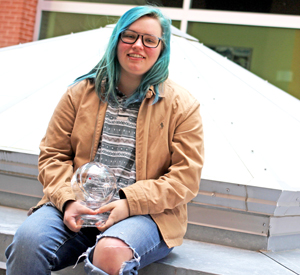
St. Thomas University student Elijah Matheson was the recipient of a 2017 Red Cross Power of Humanity Award for their work as an advocate for the LGBTQIA+ community.
Matheson is a founding member and co-chair of STU’sQueer and Allied People's Society (Q and A); however, their advocacy work began at Sir James Dunn High School in Saint Andrews, NB, where they held the position of president of the Gay Straight Alliance (GSA).
During that time, Matheson helped form a New Brunswick-wide network for LGBTQIA+ youth and worked to send a New Brunswick delegation to the first national GSA summit in Toronto. They also contributed to Egale Canada’s LGBTQ inclusion handbook for Canadian teachers and helped facilitate student contributions to the province’s Department of Education’s Policy E9 on LGBTQIA+ inclusive environments.
Matheson’s work was fueled by their belief that middle and high school is a crucial time to have supports in place. They said that’s when many youth are coming into who they are and trying to navigate being comfortable so they can lead healthy, productive, and happy lives. Something, Matheson said can be challenging for LGBTQIA+ youth.
“It’s hard enough to make the transition from high school into your adult life, but knowing you’re going to face additional discrimination can be scary. There has to be extra support for these youth,” they said.
Matheson believes clubs like the GSA support to young people they may not get elsewhere.
“With a lot of bullying, you can go home to your parents and say, ‘they’re making fun of me because I have glasses,’ and your parents understand that and support you through it,” they said. “But when you’re getting bullied because you’re queer or people think you’re queer, you may not feel like your parents will understand or be able to support you.”
“If I hadn’t joined the GSA in high school, my development would have gone a lot differently. I would not have had that group of friends who made me feel I could be open with them about who I was.”
Exposure and Visibility — “Kids have to be able to see themselves in the world”
Exposure and visibility are goals Matheson focuses on in their advocacy work.
“Kids have to be able to see themselves in the world and see they can achieve what they want no matter who they are—and they need role models to be able to do that. They need to be taught about these role models and learn about LGBTQIA+ history. We need to start better normalizing all the different ways of being,” Matheson said.
Queer and Allied People Society at STU
As co-chair of Q and A, Matheson said they try to spread as much positivity and empowerment as possible—focusing on pride, bringing people together who accept and understand each other, celebrating one another, and interacting with allies. They said it’s sometimes easy to focus too much on the heaviness of discrimination and injustice, but being LGBTQIA+ is about more than that.
“Events that highlight injustices are so important, but I think it’s also important to have light and upbeat events. We have weekly support meetings where people can talk about what’s going on in their lives and also about what’s going on in the world, and we have events where we just celebrate the community like our coffee houses.”
As the name suggests, Matheson said allies play an important role.
“Allies are so important because they’re the ones who can easily be bystanders or moderates,” they added. “It’s important to be proactive—to be educated and meet people in the community before there’s someone in your life who needs your understanding and support. You could be the person they come to when they’re trying to figure things out and even knowing about what resources are out there could be really helpful for them.”
Choosing St. Thomas University
Matheson studies Human Rights, Journalism, and Sociology at St. Thomas and enjoys finding ways to connect school work with humanitarian work.
“I’m working on a series of profiles of queer activists in Fredericton,” they said. “I’ve been inspired to lift other people up now that I’ve been recognized, so I’m trying to spread the love while working on my craft.”
Being recognized by the Red Cross is something Matheson said they value not only on a personal level, but because of what it says about humanitarianism on a larger scale.
“The Red Cross recognizes there are different ways to help humanity and to be a humanitarian,” they said. “It’s great that a big organization known for their humanitarian work recognizes queer rights activism is as important as other humanitarianism. I think that’s meaningful.”
-(2).jpg)